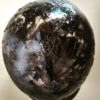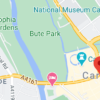Seminar Blogs

“Why is a Platonic Binary Useful?” – Hannah Harder
It seems that Jon Mckenzie posits the gap between doxa and episteme as a productive negative space that can reveal new forms of knowledge. These terms differentiate between the entangled, contextual knowing that is placed against formal knowledge production. My studies in media, art and performance have shown that we can engage with meaning through…
Read more
“On Civic Participation through Performative Protest” – Bernice Ong
In this session with Jon McKenzie, Lara Harvey and Veronica Cinibulk from Cornell University (January 27, 2021), we were introduced to the term Design Justice. This is an ongoing movement where communities and individuals would strategically use cultural performance forms to carry out activism work through persuasive, human-centered content. While the inherent positioning is one…
Read more
“Episteme and Doxa: Addressing a Binary” – Floor Mijland
In a whirlwind of energy, Jon McKenzie started the 4th Transmission in Motion seminar on January 27th, 2021. Once his PowerPoint is shared, he is off: introducing himself, ‘Perform or Else’, the concept of design justice, and then he states the following: Doxa is ‘the world’ and episteme is ‘theory’, and theory is ‘the problem’….
Read more
“Algorithm Auditing? Meet Design Thinking!” – Daniël Everts
Right now, I am just finishing up on a data-driven research project on algorithmic bias in the Dutch job seeking process. Recently, a question arose amongst the members of the research team: how might such a project actually yield the knowledge necessary to exact any real change in practice? It is a question that had…
Read more
“Becoming Through Pedagogies – Anthony Nestel
In his book Transmedia Knowledge for Liberal Arts and Community Engagement: A Studiolab Manifesto (2019) Jon McKenzie advocates the remix of episteme – expert knowledge – and doxa – common knowledge – in order, in McKenzie words, “to open up the unknown within the known” (McKenzie 2019, 60). The encounter between these two forms of…
Read more
“Locally Manifested Global Injustices” – Hymke Theunissen
Many highly influential global movements that strive to end injustice have traveled via social media across the ocean from the United States to Europe. #MeToo, the global movement against sexual harassment, and Black Lives Matter, the global movement against racism, originated in the United States but have ever since spread across the world. These movements…
Read more
“Mixing Episteme and Doxa – The Key to Increase Engagement in Business Design Thinking” – Liang Yue
Since Nobel Prize laureate Herbert Simon had first described “design thinking” in 1969, the methodology of design thinking and its variations have been adopted by all walks of life. It is an iterative process in which alternative strategies and solutions are developed to tackle the human-centered problem, generally including five phases: empathy, define, ideate, prototype,…
Read more
“Landmark Building: The Interface with the Past” – Liang Yue
In the seminar of “The Cardiff Race Riots (1919): retraced, redrawn”, Mike Pearson, Professor Emeritus of Performance Studies at Aberystwyth University, shared his research project undertaken with National Theatre Wales about the Cardiff Race Riots. Personally speaking, among all the elements he used to retrace the historical event, those landmark buildings on the map of…
Read more
“History as Art, or Vice-Versa” – Bernice Ong
Mike Pearson, Professor Emeritus of Performance Studies at Aberystwyth University and Researcher for the Cardiff Race Riots series, walks us back to 1919 in the seminar session on 16 Dec 2020, through a ‘live’ reading of the reconstructed event with accompanying slides of old Butetown and character mugshots. Historically, the neighborhood was known to have…
Read more
“In Search of Lost Places (and Their Histories): Situating and Performing the 1919 Cardiff Race Riots with a Digital Graphic Novel” – Danny Steur
How are histories usually told? Though I am no student of history, I would say this most commonly occurs by chronicling the actions of history’s greatest persons: their remarkable, heroic undertakings, or maybe rather their horrendous activities. Naturally, a wide variety of forms of conveying histories exist, but a remarkable practice that I was unfamiliar…
Read more
